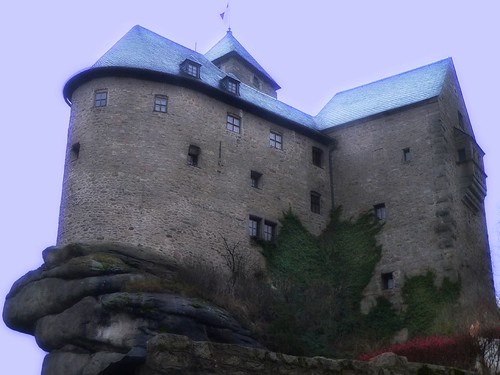 | |||
| Scenic Burg Falkenberg, Bavaria |
 |
| Scenic Pilgrim’s Church of the Holy Trinity, Bavaria |
The Guardian reported that many of these stories were "rediscovered," but Harvard folklorist Maria Tatar amends this account in a recent post on New Yorker Magazine's "Book Bench" blog, reporting that the stories were not not so much lost but languishing. Von Schönwerth is on the shelf at some American academic libraries, but many of the stories he collected are in manuscript form (untranslated from German), and, unlike those collected by his contemporaries, were not polished into smooth narratives. Tatar writes for the New Yorker:
Schönwerth’s tales have a compositional fierceness and energy rarely seen in stories gathered by the Brothers Grimm or Charles Perrault, collectors who gave us relatively tame versions of “Little Red Riding Hood,” “Snow White,” “Cinderella,” and “Rapunzel.” Schönwerth gives us a harsher dose of reality than most collections. His Cinderella is a woodcutter’s daughter who uses golden slippers to recover her beloved from beyond the moon and the sun. His miller’s daughter wields an ax and uses it to disenchant a prince by chopping off the tail of a gigantic black cat. The stories remain untouched by literary sensibilities. No throat-clearing for Schönwerth, who begins in medias res, with “A princess was ill” or “A prince was lost in the woods,” rather than “Once upon a time…”
Read the full post. Writing on her own blog, Maria Tatar promises "Next week, I’ll add my translation from one of the tales in Prinz Rosszwifl." I am looking forward to it!
In a tenuously-related but interesting parallel, when one googles "Bavarian Turnip," the top hit is an abstract from a journal article: "Notes on neglected and underutilized crops —The ‘Bavarian Turnip’ — a rediscovered local vegetable variety of Brassica rapa L. em. Metzg. var.rapa"
The 'Bavarian Turnip,' ('Bayerische Rübe,' Brassica rapa L. em. Metzg. var. rapa) is a nearly lost crop today. Until 1900, this local variety was commonly grown in Bavaria for human consumption. The special and very distinct characters of this variety in comparison with recent breeds are preferred by the farmers' families and assured the persistence and survival of this turnip in situ (on farm). In the region of Dachau and Freising, located north of Munich, only four farms are known, where this old crop is still grown and maintained. Urgent measures have to be taken to safe this cultural relict for future generations.
 |
| Scenic Horse in Scenic Turnip Field |
No comments:
Post a Comment